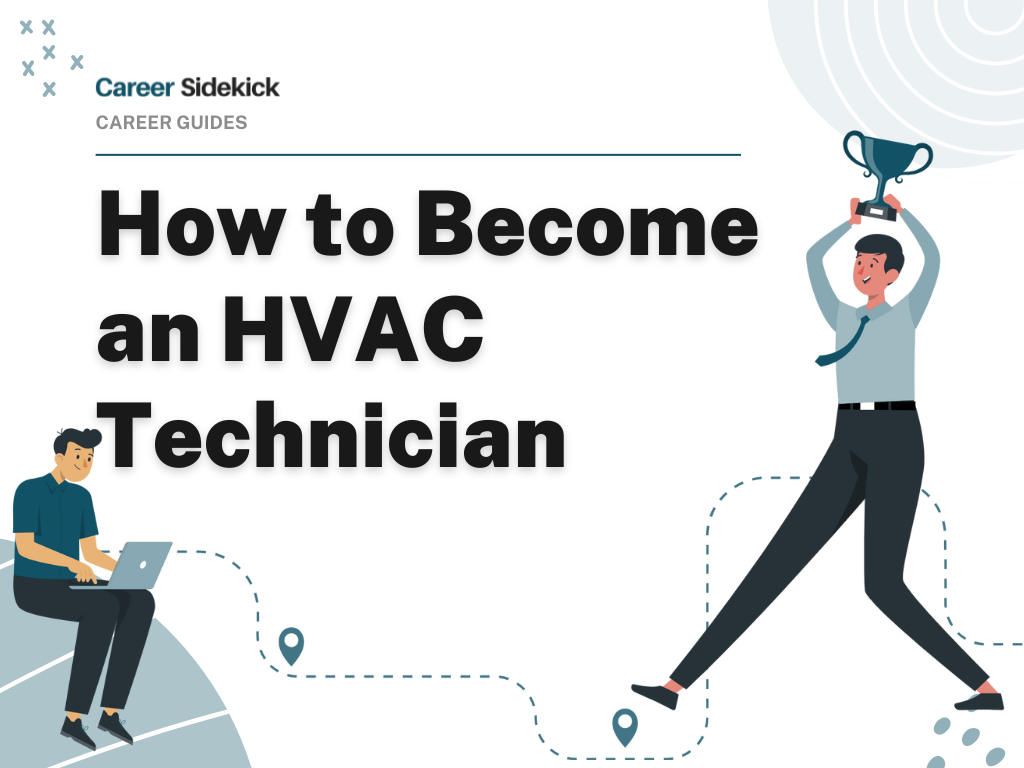
To become an HVAC Technician, there are several common steps you can follow. Here is a general outline of the process:
Step 1: Obtain a High School Diploma or Equivalent
A high school diploma or equivalent is typically required to enter a formal HVAC training program or apprenticeship. Focus on subjects like mathematics, physics, and vocational courses that emphasize mechanical and technical skills.
Step 2: Pursue HVAC Training
There are multiple paths to gain HVAC training and education:
- Vocational or Trade School: You can enroll in a vocational or trade school that offers HVAC programs. These programs provide a structured curriculum covering topics such as electrical systems, refrigeration, airflow, system design, and troubleshooting.
- Community College: Consider earning an associate degree in HVAC technology from a community college. These programs provide a more comprehensive education that includes both technical coursework and general education classes.
- Apprenticeship Programs: You may choose to enter an HVAC apprenticeship program, which combines on-the-job training with classroom instruction. Apprenticeships are offered by trade associations, unions, or HVAC companies. During the apprenticeship, you work alongside experienced technicians, gaining hands-on experience while earning a wage.
How Long Does it Take to Complete HVAC Training
The amount of time that it takes you to complete the training required to become an HVAC technician will depend on the type of training that you choose to get.
If you complete your training through a trade school or vocational school, completing a program can take anywhere from several months to two years. Apprenticeships typically last 3 to 5 years. Associate degrees at community colleges typically take two years, but this may vary depending on the amount of work that you can take on.
Do I need a Degree to Become an HVAC Technician?
No, a degree is not typically required to become an HVAC technician. While you may choose to pursue an associate degree in HVAC technology from a community college, it is not a strict requirement for entry into the field.
It’s important to research the specific requirements of your state, as licensing or certification requirements for HVAC technicians may vary. Additionally, certain positions within the HVAC field, such as HVAC engineering or HVAC management roles, may have different educational requirements that could benefit from a degree in engineering or related fields.
Can I Become an HVAC Technician Through Online Education?
While online education can provide you with valuable theoretical knowledge and a foundational understanding of HVAC principles, becoming an HVAC Technician typically requires hands-on practical training and experience. Therefore, fully online programs may not be sufficient on their own to become a competent HVAC technician.
How Much Does it Cost to Pursue HVAC Training?
The cost of pursuing HVAC training can vary depending on several factors, including the type of training program, the institution or provider, the location, and the duration of the program. Here are some factors to consider when determining the cost of HVAC training:
- Vocational or Trade School Programs: Vocational or trade school programs typically can range from a few thousand dollars to tens of thousands of dollars.
- Associate Degree Programs: The cost of these programs can range from $15,000 to around $35,000, depending on the institution and location.
- Apprenticeship Programs: The cost of apprenticeships varies as apprentices are typically paid a wage during their training period. Some apprenticeship programs may require the apprentice to cover the cost of textbooks, tools, or exam fees. However, the cost of an apprenticeship is lower compared to formal education programs and can range from $500 to $2,000.
Step 3: Obtain Required Licenses and Certifications
You should check the requirements of your local or state regulatory bodies to determine if HVAC technicians need to hold licenses or certifications. Industry-recognized certifications, such as those offered by organizations like North American Technician Excellence (NATE) or HVAC Excellence, can enhance your credentials and demonstrate your competence in the field.
Is it Difficult To Get an HVAC Technician Certificate?
Obtaining a license through the North American Technician Excellence (NATE) organization as an HVAC technician requires meeting specific criteria and passing NATE’s HVAC technician certification exams. While the process may pose some challenges for you, it is achievable with proper preparation and dedication. Here are some key points to consider:
- Exam Preparation: NATE offers various certification exams that assess your knowledge and skills in different HVAC specialties, such as air conditioning, heat pumps, gas furnaces, and air distribution. The exams consist of both core knowledge questions and specialty-specific questions. It is essential to thoroughly study the exam topics, review technical materials, and utilize study resources provided by NATE. This will help you familiarize yourself with the exam content and increase your chances of success.
- Hands-on Experience: NATE certification exams not only test theoretical knowledge but also assess practical skills. Having hands-on experience in the HVAC field is beneficial when taking the exams, as it allows you to apply your knowledge to real-world scenarios. Practical experience can help you understand the systems and components you’ll encounter on the job, enhancing your ability to troubleshoot and solve problems effectively.
- Exam Administration: NATE certification exams are proctored by approved testing centers. Locate a nearby testing center and familiarize yourself with its policies, procedures, and scheduling requirements. Ensure you meet any eligibility requirements set by NATE and the testing center before registering for the exam.
Step 4: Gain Practical Experience
Whether through an apprenticeship or entry-level position, gaining practical experience is crucial. Working under the guidance of experienced HVAC technicians allows you to apply theoretical knowledge, develop hands-on skills, and learn industry best practices.
What are Internship Opportunities for an HVAC Technician
Aspiring HVAC technicians have the opportunity to gain valuable experience through a variety of internships.
One option is to intern with HVAC companies. Working alongside experienced technicians, interns assist with installations, repairs, maintenance, and troubleshooting. This experience offers practical skills and a deeper understanding of the day-to-day operations of the HVAC business.
Interning with construction companies or contractors involved in HVAC installations is yet another avenue. In this role, interns contribute to ductwork installations, equipment placement, and system testing. This hands-on experience provides insights into the initial stages of HVAC system setup and coordination with other trades.
Energy efficiency and sustainability programs also offer internships in the HVAC field. Interns may work with utility companies or energy consulting firms, conducting energy audits, implementing energy-saving measures, and analyzing HVAC system performance. This exposure helps interns develop knowledge of energy-efficient practices, emerging technologies, and environmental considerations.
Lastly, some HVAC equipment manufacturers offer internship programs. These internships focus on providing hands-on experience with specific HVAC systems. Interns assist with equipment testing, troubleshooting, and may even participate in research and development projects, gaining specialized knowledge and understanding of the latest technological advancements.
Step 5: Continuously Update Skills and Knowledge
The HVAC field is constantly evolving, with new technologies and regulations emerging. Stay updated by attending workshops, seminars, and manufacturer training sessions to learn about the latest equipment, controls, energy efficiency standards, and industry trends. Continuously improving your skills and knowledge will enhance your career prospects and ensure you provide the best service to customers.
What Skills Will I Learn as an HVAC Technician?
As an HVAC Technician, you will acquire a range of skills that are essential for the installation, maintenance, repair, and troubleshooting of heating, ventilation, and air conditioning systems. Here are some key skills you can expect to learn and develop:
- HVAC System Knowledge: You will gain a deep understanding of various HVAC systems, including their components, functionality, and operating principles. This includes knowledge of heating systems (furnaces, boilers), cooling systems (air conditioners, heat pumps), ventilation systems (ductwork, fans), and control systems (thermostats, sensors).
- Electrical Skills: You will learn electrical fundamentals and how they relate to HVAC systems. This includes knowledge of electrical circuits, wiring, voltage, amperage, and safety protocols. You will acquire skills in reading electrical diagrams, troubleshooting electrical issues, and safely working with electrical components.
- Refrigeration Principles: Refrigeration is a fundamental aspect of HVAC systems. You will learn about the principles of refrigeration, including the refrigeration cycle, refrigerant properties, heat transfer, and the operation of compressors, condensers, evaporators, and expansion valves.
- System Installation and Maintenance: You will learn how to install HVAC systems, including proper sizing, placement, and connection of equipment, as well as the installation of ductwork and ventilation systems. Additionally, you will gain skills in performing routine maintenance tasks such as cleaning coils, replacing filters, lubricating components, and inspecting system performance.
- Troubleshooting and Repair: HVAC Technicians must be skilled in diagnosing and resolving system issues. You will learn how to troubleshoot and identify problems in HVAC systems, whether they are related to mechanical components, electrical issues, refrigerant leaks, or airflow imbalances. You will acquire the ability to repair or replace faulty components, perform system adjustments, and restore proper system operation.
- Safety Practices: Safety is paramount in the HVAC field. You will learn and adhere to safety protocols to ensure your well-being and the well-being of others. This includes knowledge of electrical safety, handling refrigerants safely, proper use of personal protective equipment (PPE), and following industry-specific safety guidelines.
What are Some Web Resources to Learn Skills to Become an HVAC Technician
There are several web resources available that can help you learn skills and gain knowledge to become an HVAC Technician. Here are some reputable websites and online platforms where you can find valuable HVAC training materials, courses, and resources:
- HVAC School: HVAC School provides a collection of podcasts, videos, and articles created by experienced HVAC professionals. They cover various aspects of HVAC, including technical knowledge, practical tips, and industry insights.
- HVAC Redu: HVAC Redu offers online HVAC training courses that cover a wide range of topics, from basic principles to advanced system diagnostics. Their courses are designed for technicians at various skill levels and can be accessed anytime, anywhere.
- Building Performance Institute (BPI): BPI is a recognized organization in the energy efficiency and building performance industry. They offer online training and certification programs related to HVAC system diagnostics, airflow, combustion analysis, and energy efficiency measures.
- HVAC Excellence: HVAC Excellence is an organization that offers certifications and resources for HVAC professionals. Their website provides access to study materials, practice exams, and educational resources to enhance your HVAC knowledge and skills.
#HVAC #Technician #Career #Sidekick



